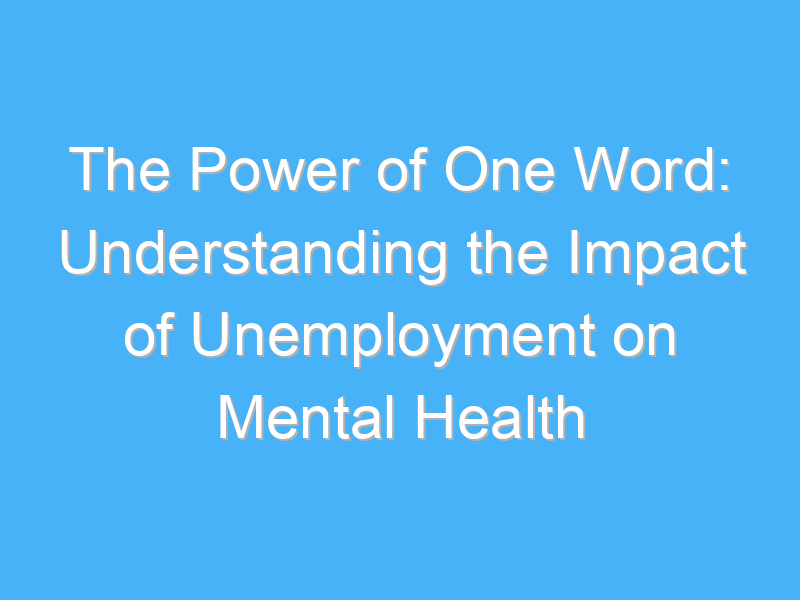
The Power of One Word: Understanding the Impact of Unemployment on Mental Health
In today’s society, various individuals face the situation of unemployment. Unemployment is a concerning issue globally, and it affects not only the individual but also their families and the community as a whole. When referring to someone who has no work, there are several words in the English language to describe this situation. However, in this discussion, we will focus on one specific word that defines a person with no job.
The Stigma of Unemployment: The One Word that Defines a Person’s Identity
Losing a job is one of the most challenging experiences that a person can go through. It can be a traumatic experience, leaving individuals feeling lost, hopeless, and without a sense of purpose. Unemployment can affect a person’s identity, creating a stigma that can be difficult to shake off. The one word that often defines an unemployed person is “unemployed.” The label can be limiting, leading to feelings of inadequacy, low self-worth, and social isolation.
The Psychological Impact of Unemployment: Understanding the Link Between Unemployment and Mental Health
The psychological impact of unemployment is widespread, and it can affect people of all ages, races, and socio-economic backgrounds. Studies have shown that unemployment can lead to a range of mental health problems, including depression, anxiety, and stress. Moreover, unemployment can lead to substance abuse, relationship problems, and even suicide.
The Importance of Social Support: The Role of Family and Friends in Supporting Unemployed Individuals
Social support is crucial for unemployed individuals, as it can help them cope with the stress and uncertainty of job loss. Family and friends can provide emotional support, practical assistance, and a sense of belonging. A strong support system can help unemployed individuals stay positive, motivated, and focused on their goals.
Overcoming the Stigma: Resilience, Perseverance, and Self-Belief
Overcoming the stigma of unemployment requires resilience, perseverance, and self-belief. It’s essential to remember that unemployment is not a personal failure, but a temporary setback that can happen to anyone.
The Power of Positive Thinking: Harnessing the Power of Positive Thoughts to Overcome the Stigma of Unemployment
Positive thinking is a powerful tool that can help unemployed individuals overcome the stigma of unemployment. By focusing on their strengths, skills, and achievements, they can build their self-confidence and self-worth. Positive thinking can also help unemployed individuals stay motivated, focused, and optimistic about their future job prospects.
Setting Realistic Goals: The Importance of Setting Achievable Goals to Build Confidence and Motivation
Setting realistic goals is essential for unemployed individuals. By setting achievable goals, they can build their confidence, motivation, and self-belief. It’s important to remember that finding a job takes time and effort, and it’s essential to set realistic expectations about the job search process.
Finding Meaning and Purpose: The Importance of Pursuing Hobbies and Interests to Build Self-Worth and Identity
Unemployment can be an opportunity for individuals to pursue their hobbies and interests, building their sense of self-worth and identity. Pursuing creative activities, volunteering, or pursuing education and training can help unemployed individuals stay engaged, motivated, and positive about their future.
FAQs – What is one word for a person who has no work?
What is the one word for a person who has no work?
The one word for a person who has no work is “unemployed.” This term is used to describe individuals who do not have a job and are actively seeking employment.
Are there any other words that can be used to describe a person who has no work?
Yes, there are various words that can be used to describe a person who has no work. Some of these words include jobless, redundant, out of work, and idle.
Is being “unemployed” the same as being “underemployed”?
No, being unemployed and being underemployed are not the same. “Unemployed” refers to a person who is jobless and actively looking for work, while “underemployed” refers to a person who is working but not in a job that fully utilizes their skills or education.
Can “unemployed” apply to someone who chooses not to work?
No, “unemployed” does not apply to someone who chooses not to work. The term is specifically for individuals who are actively seeking employment but have not yet found work.
What is the impact of being unemployed?
Being unemployed can have significant impacts on an individual’s wellbeing and financial stability. It can lead to financial difficulties, loss of self-esteem, mental health issues, and strained social relationships. It is important for individuals who find themselves unemployed to seek support and resources to help them navigate this difficult situation.
